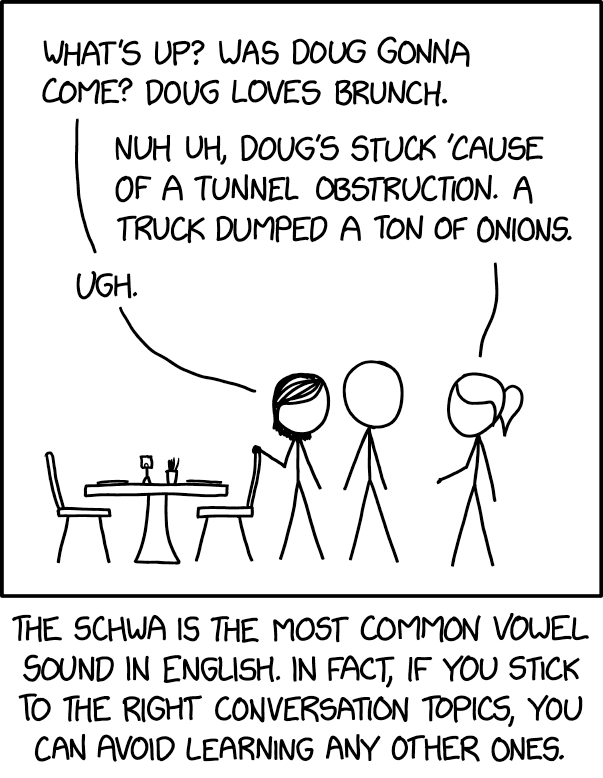this post was submitted on 16 Mar 2024
577 points (97.5% liked)
xkcd
9327 readers
377 users here now
A community for a webcomic of romance, sarcasm, math, and language.
founded 2 years ago
MODERATORS
you are viewing a single comment's thread
view the rest of the comments
view the rest of the comments

Don't a lot of these use the "strut" vowel (/ʌ/) and not schwa (/ə/) per se?
My transcription would be
/wʌts ʌp? wʌz dʌg gənə kʌm? dʌg lʌvz bɹʌntʃ. nʌʔʌ dʌgz stʌk kəz əv ə tʌnəl əbstɹʌkʃən. ə tɹʌk dʌmpt ə tʌn əv ʌnjənz. ʊχ./
They merge in many accents merge these two sounds as Dr Geoff Lindsey explains here.
Thank you for reminding me of this channel, I'd forgotten about it.
Interesting about the merging. Schwa has always been weird for me because in my dialect it can be many sounds. I grew up saying "obstruction" as [ʌbstɹʌkʃɪn] like those around me. Then I hit grade school and was told by a straight-faced teacher that both the first and last syllables in this and similar words were schwas while pronouncing them differently :)
The point about stress is interesting. I've been playing with pronouncing the phrase, and almost everything tends toward [ɐ] when I speak the syllables one at a time, even the ones I marked with and pronounce as a schwa in normal speech. The notable exceptions are the final schwas in "obstruction" and "onions", which tend toward [ɪ], and the -nel of "tunnel", which is something like [nɫ] (vocalic ɫ) ~ [nəɫ].
You use the same vowel for 'what' as you do for 'up'?
:confused Australian noises:
Oh you're Australian. Yeah, most dialects in the US say "what" and "up" with a schwa.
Wut up. The 'u' vowel sound in "up" is the same one in "what" in most American dialects.
The schwa is the same vowel sound in duzza. Wuzza uppa.
yup
whut?
Australian version is similar:
/wɒts ʌp? wʌz dʌg gənə kʌm? dʌg lʌvz bɹʌntʃ. nʌʔʌ dʌgz stʌk kəz ɒv ə tʌnəl ɒbstɹʌkʃən. ə tɹʌk dʌmpt ə tʌn ɒv ʌnjənz. əχ./
Dann y'all are good at IPA
One day I'll learn it, after I learn the NATO phonetic alphabet, dvorak typing, and Morse code.
It helps when most of the vowels are the same and most other letters match their English counterparts lol.
In case you get the urge to learn sooner:
Here are some quick refs for consonants and vowels in English (RP = received pronunciation (a standardized form of English from the UK), GA = General American). Wikipedia pages for specific English dialects (e.g., Australian English) also contain a bunch of word/IPA pairs. Here are audio charts for vowels and consonants.
Start with dvorak. It’ll ruin you best. You’ll be that person to your it department